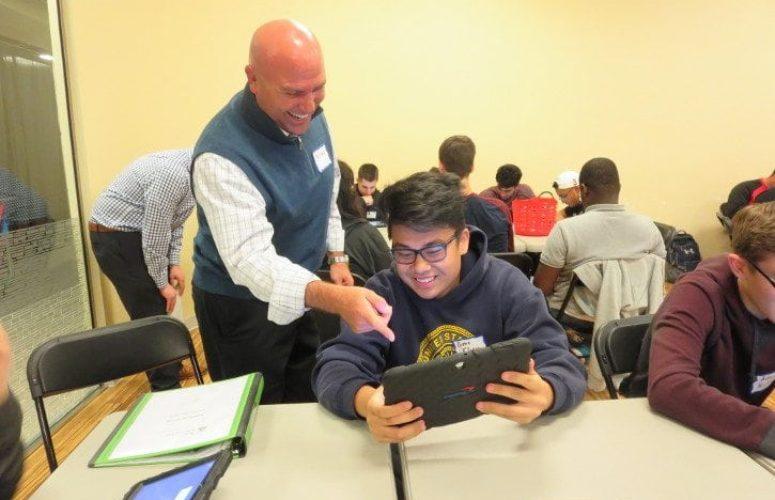
The Need for Financial Literacy
By Joe Cavaluzzi, Contributing Writer On Aug 22, 2017The financial crisis, burgeoning college debt, the constant carryover of monthly credit card debt and a decline in savings are driving New Jersey lenders to broaden the initiatives to bolster the financial literacy of the state’s residents.
While most financial literacy programs focus on high school or college students, New Jersey banks and credit unions are broadening their reach to other segments of the population, especially vulnerable groups such as senior citizens, through programs offered by the New Jersey Bankers Association and the New Jersey Credit Union League. Members participate in numerous partnerships with schools, youth organizations such as Junior Achievement, and the state Department of Banking and Insurance, and Department of Education to help students learn the nuts and bolts of personal finance and the impact of time on savings.
Financial Literacy: A National Concern
The Council for Economic Education reports 4 in 10 millennials say they are overwhelmed with debt and more than half of them say they are living paycheck to paycheck, unable to save for the future. Federal Reserve data indicates that the 44 million Americans with college loan debt owe $1.44 trillion and 11.2 percent – almost 5 million – of them are 90 days overdue or in default.
But it’s not just recent college graduates having difficulty shouldering their debt burden. Nearly one in four Americans admit to not paying their bills on time. The 2017 Financial Literacy Survey, conducted online by Harris Poll for the National Foundation for Credit Counseling, found significantly more US adults carry credit card debt from month to month – 39 percent versus 36 percent last year – with nearly 2 in 10 adults saying they roll over $2,500 or more in credit card debt each month.
Bad Individual Choices Hurt the Economy
The outputs of financial illiteracy impact the country’s consumer-driven economy with 26 percent of adults in the Consumer Financial Survey reporting they are spending less this year than last.
“Many people would agree that one of the reasons for the financial crisis was people got into products they shouldn’t have gotten into, in part because of lack of knowledge,” John E. McWeeney, Jr., president and CEO of New Jersey Bankers Association, says. “It doesn’t do anybody any good if consumers don’t handle credit cards properly or default on a loan. Ultimately, it makes it harder for them to do bigger things.”
NJBankers Association formed the Financial Literacy Program in partnership with the state Department of Banking and Insurance and the Department of Education. Now in its sixth year, the Financial Literacy Program has reached more than 30,000 students in more than 300 public high schools from all 21 counties. Bank financial counselors teach students how to establish and preserve good credit, set up a budget, open checking and savings accounts and guard against identity theft.
Michael Hou, chairperson of NJ Credit Union League Foundation, which sponsors Financial Reality Fairs for high school students throughout the state, says lifestyle desires that don’t mesh with financial reality create debt and savings problems that strain the economy.
“A lot of graduates have crushing college loan debt. They’re not spending money on other things. That hurts the economy. If they choose to not pay their debt and go bankrupt, that hurts their credit and ability to buy a house or get a car loan, and that hurts the economy,” Hou says. “People don’t know how to separate what they want versus living within their means. You have to have a plan.”
Lenders Bolster State Attempt to Address Need in Schools
The state of New Jersey recognized the importance of financial literacy in the wake of the 2008 real estate and banking crisis, when real estate values in America plummet by at least $4.2 trillion. The state added financial literacy as high school graduation requirement in the 2010-2011 freshmen class. All students must take at least 2.5 credits in financial, economic, business and entrepreneurial literacy to demonstrate an understanding about how the economy works and their own role in it as well as the necessary skills to effectively manage personal finances by the time they graduate.
The NJ Credit Union Foundation’s Financial Reality Fairs help high school students understand what it would take to live the lifestyle they envision. After identifying their career choices and starting salaries, students complete a budget worksheet requiring them to live within their monthly salary while paying for basics such as housing, utilities, transportation, clothing and food.
“We have reached more than 8,600 students since the program started. We held 18 fairs in the last school year alone, reaching more than 2,400 students,” Hou says, adding that the largest fairs are held at Rutgers University and Ocean County College. “Students meet with financial counselors and, by role playing, we give them a dose of reality. It’s always fun to watch their faces when you sit down with them and start budgeting for what they will need to live the financial lifestyle they have in mind,” he says.
Recently, the National Youth Involvement Board (NYIB), a financial education resource for credit unions across the country, recognized the NJ Credit Union Financial Reality Fairs Program at its annual convention in July for the most students reached by a team.
Junior Achievement of New Jersey incorporated the state graduation requirements into its JA Finance Park experience. Located at the non-profit’s Edison headquarters, Finance Park presents an opportunity for students to learn about college and career goals, credit scores, savings, investing, insurance and risk management. They role-play as adults and delve into all aspects of what it takes to build and maintain a realistic family budget.
“There is a big knowledge gap among teenagers,” says Christy Tighe, director of college and career readiness at Junior Achievement. “A lot of that has to do with access to financial literacy classes. If you cannot get that information from school, you have to get it from your parents or your friends (whose knowledge levels vary based on their experience and backgrounds). The state graduation requirement is going to even everything out whether you are from Newark or Short Hills.”
Expanding largely through word-of-mouth advertising by teachers who have participated, Junior Achievement expects to reach more than 12,000 students at JA Finance Park this year. Already, the non-profit organization has reached 68,000 students through Finance Park and other programs. The organization also provides teaching materials the state did not fund in its graduation requirement legislation.
Partnerships, New Tools Address More People
Junior Achievement engages community and bank volunteers, such as Capital One Bank, which provides financial mentors for a day, to make its programs more relevant and impactful. The Credit Union League has modified its Financial Reality Fairs to be relevant to college students at New Jersey City University and Ocean County College. “We’re trying to educate the public and our membership to live within their means,” Hou says. “Some credit unions in NJ have started providing counseling for adults.”
About 15 NJBankers member banks are active in the American Bankers Association’s “Teach Children to Save” program at elementary schools and its “Get Smart About Credit” program for high school and college students. About a dozen member banks sponsor “Senior Crime Stoppers” programs at nursing homes, where they install safe deposit boxes for the residents and put in place a whistleblower program so seniors can report abuse or theft by employees. Others among the 95 banks in the New Jersey association sponsor online financial literacy programs through entities such as Princeton-based DoughMain Education Foundation, which creates online programs that let families conduct financial literacy education at home.
McWeeney and Hou say lenders will continue to expand partnerships in pursuit of greater reach in their financial literacy programs as consumers of all ages wrestle a changing economy. As Junior Achievement’s Tighe puts it: “You have to be savvy. We’re living longer and we have a lot more choices. We always left it (retirement saving) to the experts, but we cannot anymore. The time to save is now.”
Related Articles:





